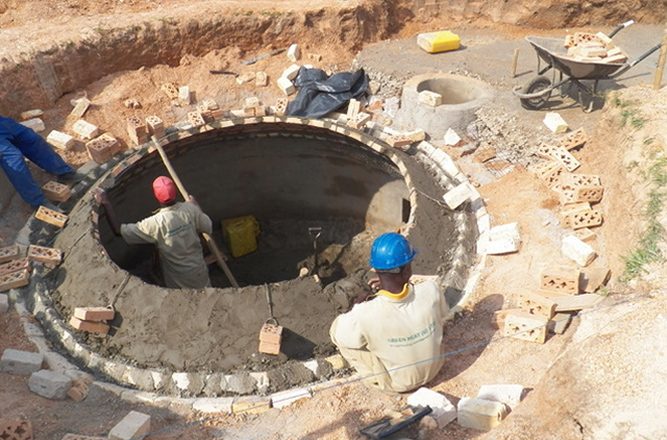An interview with Vianney Tumwesige, Managing Director of Green Heat. Ms. Lukiya Mutesi has had a dairy farm in Iganga for over forty years now. She, however, only learnt about biogas technology and the potential to have it generated at her farm four years ago. Her experience is not different from those of many other farmers and ordinary citizens in Uganda; gifted with natural resource and living in communities with tons of organic material in the form of human and animal waste, as well as plant cuttings, yet having limited knowledge of how to make the most of it like generating biogas to use in households and at institutional level.
This is what drove Vianney Tumwesige, the founder of Green Heat International, to start his social enterprise to bring biogas technology closer to the people, and to educate local communities about available important alternative sources of biogas energy and waste management. For the past seven years of its existence, the company has been dedicated to generating biogas for institutional and household use in Africa and Haiti, and created awareness about the technology in different communities from the local level to national and regional levels.
Green Heat took a decentralized approach to generation and distribution of biogas energy to consumers where gas is produced and used directly on-site. Mr Tumwesige explains that this was a more practical approach appropriate for the Ugandan context where biogas distribution from one central location over long distances hasn’t been explored.
From its efforts, the enterprise has reached over 20,000 people with awareness about the technology, and installed over 800 digesters at the household and institutional level in different parts of Africa; three in Togo, two in Mozambique, twenty in Ethiopia, twenty in Haiti, and the remainder in Uganda.
The team has grown from having a single permanent staff member and one support volunteer to 15 fulltime staffers and over 50 contractors; capitalizing on the model of building a franchise of biogas digester masons in different parts of the region at the national and regional level. A
s part of its long-term vision, Green Heat continues to focus on empowering masons by training them on how to build different types of digesters, and to make this feasible, it has built capacity of masons in different regions.
In other words, building a franchise of masons has been important in addressing the technical expertise gap needed in developing and expanding the business to other parts of the region. Mr Tumwesige notes that a lack of technical expertise in building digesters has been a challenge they have had to confront in almost all countries of Green Heat’s operation in Sub-Saharan Africa.
To remain operational and relevant, and to expand its reach in growing economies, Green Heat capitalizes on innovation and improving its products’ output to consumers. Such innovations include; adding the use of biogas to fuel refrigerators for milk coolers at dairy farms, and introducing cutting edge technology such as Slurry Separation System (SST) that enables for water used in generation of gas in digesters to be recycled for use without compromising the quality of the system.
According to Vianney, these innovations
attract more clients and investors, and could potentially open up opportunities for finance institutions to consider investing in this technology. Innovations
have helped address some challenges Green Heat has encountered while working with its consumers. For example, access to fresh water needed to feed into biogas digesters has been a huge barrier for consumers especially in areas that are water stressed in . To address this, Green Heat, with financial support from USAID, has implemented the ‘Secure Water for Food’ project in Uganda, Rwanda and Ethiopia, to ensure quantification of water that is used and recycled in biogas digesters. From the project, 11 million liters (11,000 metric tonnes) of water have been recycled in a period of 3 . The team has learnt that this water innovation has helped reduce the labor requirement in collecting water for the system by 80%, reducing water consumed, thus attracting more users to the technology.
To address other challenges such as limited technical capacity and delays the enterprise encounters in collecting data to assess potential of biogas for a client’s waste resource, Green Heat has developed an online software to be used in processing and interpreting data to determine waste resource capacity to generate a given volume of gas.
Green Heat International, in collaboration with African Center for Clean Air, is working on other innovations such as technology that hopes to measure exposure to air pollution in cooking space, and extent of a person’s exposure when
cooking.
The team hopes to continue innovating and working together with stakeholders at different levels to ensure that biogas energy and waste management services are accessible to those that could benefit from it. In addition, it also hopes that current government policies and frameworks are revised and updated; for example, under the Renewable Energy Policy, tariffs on biogas should be clarified and a mandate established to support easier enforcement of biogas technology intake.

